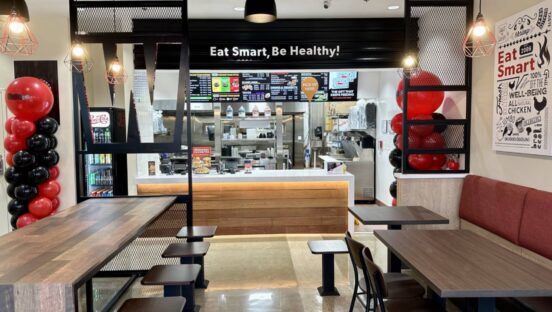With more than 40 years of restaurant experience, Sam Ballas knows a thing or two about surviving in the foodservice industry during challenging times.
Ballas is CEO and founder of East Coast Wings + Grill, a casual dining restaurant specializing in burgers, beer, and Buffalo wings with 58 flavors and eight heat indexes. He began franchising the concept in 2004, and has grown the brand’s footprint to more than 60 units open or in various stages of development. Ballas also joined the International Franchise Association’s board of directors in 2019, and was recently named Chair of the Franchisor Forum.
Given the current challenging landscape of franchising restaurants and looking ahead to 2023, Ballas gave insight on how foodservice leaders can combat pressures and prepare for growth.
If you haven’t done so already, reengineer your dining room and kitchen/back of house.
Prioritize the dine-in customer experience first and foremost, and think about how you can optimize your footprint for maximum throughput, including prepping and assembling food more efficiently. That will likely include swapping out equipment or products, and retraining some team members.
“I know a lot of casual dining c-suite peers who are all trying to reengineer their box size, seat count, and I see on Google alerts full-service brands trying to reengineer menu items to drive better gross probabilities, because inflation is killing the bottom line right now,” Ballas says.
In September 2020, Ballas used his personal funding to open a new prototypical East Coast Wings + Grill in Greensboro, North Carolina, and shrunk the footprint down to 2,200 square feet. He kept it “quasi-fast casual” and aimed for a “casual dining feel but in a very small box,” with 14 tables and two servers on the floor versus the typical five to six on a Friday night. Not only is the model less labor intensive, but it allowed Ballas to have “less people earning more money and getting more throughput.”
“I wanted to prove to the brand, even though I control it as founder, I wanted the team to be on board that we could transition this opportunity into a fast casual,” Ballas recalls.
Keep excellent hospitality at the forefront.
While consumers will associate the menu boards and counter service in East Coast Wings’ new model as a traditional fast-casual concept, guests are given a number and their food is brought to their table by those two servers.
“We kept that expediting, differentiation of service,” he says. “We stayed with the number system, and we bring [the food] to you. From that point, we’ll service you with refills.”
The prototypical restaurant struggled for about a quarter and a half, Ballas admits, but started to gain traction once consumers caught on. After two years of testing out the model and proving to his team it could offer desirable unit economics and efficiencies, excitement began building amongst the East Coast Wings system, and franchisees started asking to build more restaurants. But Ballas held them back, asking owners to be patient given challenging inflationary pressures.
“The brand has never been a brand to develop in a traditional sense,” he adds. “We ratchet opening locations when the brand feels like it, and I drive that philosophy—when we feel like the timing is right, the franchisee and location is right, and the food supply is in check.”
Be proactive in engaging with your franchisees, general managers, and customers.
Ensure customers have an easy way to leave feedback, and use that information, as well as insight from your frontline restaurant workers, to drive investments and your menu innovation.
“You’ve got to make sure you have menu engineering that satisfies what the new consumer looks like today,” Ballas says, noting that brands that were proactive and “did not egotistically stand by their 10- to 40-year run rules” saw better success and higher profits coming out of the pandemic.
Ballas also believes refocusing on helping franchisees open committed locations—versus continuing to pile on to a signed-but-unopened pipeline—is better for long-term growth. East Coast Wings + Grill, for example, pulled back from selling new franchises in 2021 when they began experiencing wiring shortages and other equipment and material challenges that led to delays. The brand waited until the second quarter of 2022 to start amping up the franchise sales process again.
“My message to franchisors is, be proactive in helping new franchisees develop smartly,” he adds.





